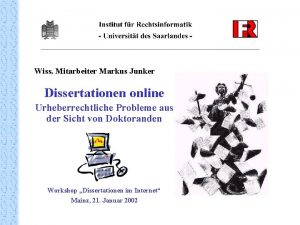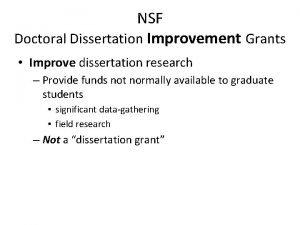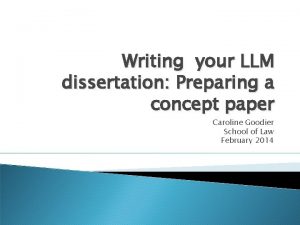Sociology Dissertation Showcase Sociology Dissertation Coordinators 201920 Dr



















- Slides: 19

Sociology Dissertation Showcase

Sociology Dissertation Coordinators 2019/20: Dr Owen Abbott Owen. abbott@manchester. ac. uk Dr Luke Yates luke. s. yates@manchester. ac. uk Introductions Sociology Dissertation Coordinators 2020/21: Dr Owen Abbott Owen. abbott@manchester. ac. uk Dr Richie Nimmo richie. nimmo@manchester. ac. uk

Coming up today… • 10: 30 -11: 15: Introduction to the Sociology Dissertation – – 2 options of sociology dissertation available Stipulations of doing each option for each pathway Assessment and workload Choosing a topic • 11: 15 onwards: A chance to ask any questions you may have

• There are two options of sociology dissertation: • 20 credit dissertation (SOCY 30920) and 40 credit dissertation (SOCY 30940) • These have separate course codes, make sure you select the right one! Credits & Prerequisites • Different programmes allow for different credit options (see the emailed handout). You may or may not have a choice. If you are unsure please check with your Programme Administrator/Director • NOTE: If you averaged less than 60% in year 2 you need permission from the Dissertation Coordinators to take 40 credits – Contact Luke or Owen about this

BSoc. Sc SOCIOLOGY • Students on this programme can take either the 20 credit or the 40 -credit dissertation • If averaging below 60 in Year 2, we suggest speaking with Luke or Owen

Linguistics and Sociology • Linguistics & Sociology students can choose to do a dissertation counting for either 20 credits or 40 credits. • Methodological approach depends on methods training • Contact course administrator for any questions

History and Sociology • History & Sociology students are required to complete a 40 -credit dissertation. • Will be asked to complete library-based/documentary analysis for dissertation unless have taken second year methods training • Speak to Luke or Owen for questions about this

BASS Students • Single and Dual Pathway (Sociology) students can take either the 20 or 40 -credit dissertation. • To do the 40 -credit dissertation you must have taken 40 -credits of Sociology in Year 2 and must take additional sociology module in Year 3. • Methods will depend on second year training. – For qualitative methods must have taken one of SOCY 20091; POLI 20901, SOAN 2084 – For quantitative methods must have taken one of SOST 20012; SOST 20022, LAWS 20441, LAWS 20452 C • Contact your course administrator for guidance

SOCY 30930: 40 credit dissertation Workload Guide: 400 hours = 14 hours a week = 2 days a week across the year How much empirical research should I aim to do? Very roughly as a guide… • Research proposal (15%) • • – Due late October/early-November – 2, 500 words, template provided • Presentation (10%) – Late February/early March – 15 minutes, no questions – groups of around 10 • Written dissertation (75%) – Due end of April/beginning May – 12000 -13000 words 6 -8 qualitative interviews 2 -4 focus groups 2 -4 periods of observation Analysis of survey using SPSS (descriptive stats and some more advanced analysis) • A combination of methods NB: you can also do a theoretical (librarybased) study, use content analysis, or archives/documents

SOCY 30920: 20 -credit dissertation Workload Guide: 200 hours of work = 7 hours a week = 1 day a week across the year • Research proposal (15%) – Due late October/early-November – 2, 500 words, template provided • Written dissertation (85%) – Due end of April/beginning May – 6000 -7000 words Note: the 20 credit dissertation differs from the 40 credit dissertation on the word count (half the length), and it has NO presentation How much empirical research should I aim to do? Very roughly as a guide… • • 3 -4 qualitative interviews 1 -2 focus groups 1 -2 periods of observation Analysis of survey using SPSS (descriptive stats) NB: you can also do a theoretical (library-based) study, use content analysis, or archives/documents

Choosing a topic • Independent study of a topic chosen by you, and finalised in consultation with your supervisor in September/October • Think about ideas over the summer and decide on general area. • You will be emailed and asked for topic early September. If you do not submit your topic by the deadline, coordinators have to allocate a supervisor without knowing what you intend to study. • Sources of inspiration: recent events, previous course units & their reading lists, ongoing personal interest/engagement.

Free reign, but consider: Choosing a topic – Personal interest - what will retain interest across the year? – Avoiding well-worn topics – think of a fresh perspective – Has to be sociological (relate to sociological literature/concepts/theories/debates) – Has to be analytic not just descriptive – poses a puzzle/question to explore – Has to involve independent research, although this includes a broad range of activities (library study/theory-based, archives, interviews, secondary survey analysis, observation, news and online sources etc. )

Topic restrictions • Workload: don’t make it too grand, keep it in proportion with your other work. Your supervisor will help you scope the project. • Personal safety: you cannot undertake ‘risky’ research that puts anyone in danger, you have to complete a ‘risk assessment’ • Ethics: You have to comply to So. SS ethical guidelines and submit an online ethics application which requires approval by your supervisor (and the School): – You will NOT be allowed to: conduct covert research, deal directly with under 18 s or vulnerable adults (note: school/classroom observations may be allowed with the relevant checks. Alert us as soon as possible if you intend to do this as the checks can take some time) – No fieldwork can be undertaken until you have ethical approval (which you submit alongside your research proposal in late October. Once approved fieldwork can begin). – You CANNOT begin fieldwork over the summer, but you can read, plan and prepare.

Sample of recent dissertation topics. . . • The role and impact of gender norms and gendered power relations in Midwifery • Family, belonging and mixed race identity • How does Colourism affect Somali women in Manchester • How narratives of industrial change, deprivation and place shaped the identities and experiences of the 2001 Bradford rioters • Human-Canine relationships in domestic environments • Attitudes towards female street sex work • Prison space, architecture and design and effects on prisoners • Representations of poverty in reality TV • Musicians, activism and social media • Low-income single mothers in a consumer society • Authenticity and cultural value amongst female artists

Sample of recent dissertation topics. . . • • • Class and the use of Parenting Apps Automisation of work in Mac. Donalds Extinction Rebellion Gender and responsibility for use of contraception Hegemonic masculinity and male bankers in finance industry Deindustrialization and masculinity in a former steel town A social semiotic analysis of the Manchester Worker Bee Precarious employment and educational attainment The media and right-wing populism EU migrants, belonging and volunteering Institutional racism and mental health Manchester community response to the 2017 bombings

Dissertation Supervisors • You will be assigned a sociology lecturer as your individual supervisor and you will have a mixture of group and individual meetings with them across the year: – As a guide, in addition to 2 -3 group meetings, 40 credits will meet individually at least twice a semester, and 20 credits once a semester • The dissertation coordinators allocates supervisors in early September: – ‘Matches’ between topic and supervisor are not promised (e. g. because you have free choice over topic)

The role of the supervisor – They respond to your ideas and plans but do not tell you what to do! – Outside of group meetings, it is your responsibility to arrange individual meetings and set agendas, they will not chase you! – You will find out who your supervisor is, and have your first group meeting, in the first dissertation lecture in September (week 1)

Dissertation Lectures • You are also supported by the dissertation coordinators and sessions across the year on the dissertation module • Sociology Futures is partly embedded within the dissertation module – some very useful careers-related sessions for job hunters! • Sessions will be something like this: – – – – – September (kick-start & first group meeting with supervisor) October (research proposal) October (Sociology Futures: Careers) November (literature review) November (Sociology Futures: Academic Writing for Dissertations) December (data analysis workshops) January (presentation planning – for 40 credits only) March (writing up, methodology, introduction and conclusion) April (Sociology Futures: Life after university, finalising the dissertation)

What to do next…. • Before the summer: – Talk with Luke, Owen or academic advisor if you want to discuss initial topic ideas. – Make sure you know the regulations, what credit option you will select, and what the dissertation involves. – Look at past first-class dissertations at UG office on 1 st floor of ALB • Over the summer: – Read, read! Think about what your topic/questions might be. • In early September: – Reply to the email asking what your general topic area is (this helps allocate supervisor) • In week 1 of semester 1: – Find out who your supervisor is and attend the first dissertation lecture and have your first group meeting with your supervisor. – Be prepared to discuss your topic area and ideas for questions/methods etc.
 Unity and coherence
Unity and coherence Naplan online training
Naplan online training Sociology dissertation topics
Sociology dissertation topics My rotary
My rotary My rotary showcase
My rotary showcase Microsoft it showcase
Microsoft it showcase Showcase revit
Showcase revit Showcase portfolio
Showcase portfolio Inception deck template
Inception deck template Agribusiness showcase & conference
Agribusiness showcase & conference Floating ads
Floating ads Druckkostenzuschuss dissertation jura
Druckkostenzuschuss dissertation jura Dissertation ses exemple
Dissertation ses exemple Doctoral dissertation research improvement grants
Doctoral dissertation research improvement grants Synopsis for dissertation
Synopsis for dissertation Brandman doctoral program
Brandman doctoral program Nsf dissertation improvement grant
Nsf dissertation improvement grant List of figures dissertation
List of figures dissertation Concept paper for dissertation
Concept paper for dissertation Ual dissertation examples
Ual dissertation examples




































